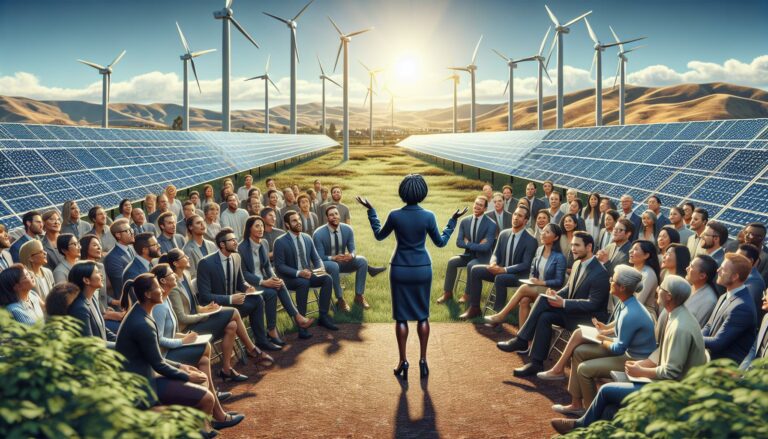The Best Fluffy Pancakes recipe you will fall in love with. Full of tips and tricks to help you make the best pancakes.

Climate Change Skeptics: Understanding 5 Types of Denialism and Their Key Arguments
As someone who’s spent years researching environmental science, I’ve encountered numerous climate change skeptics who challenge the scientific consensus on global warming. While 97% of climate scientists agree that human activities are causing climate change, a vocal minority continues to question this conclusion.
I’ve found that understanding the mindset of climate skeptics is crucial for productive dialogue about environmental issues. These skeptics often point to natural climate variations, question data accuracy, or cite economic concerns about climate action. Their arguments range from outright denial to more nuanced skepticism about the extent of human influence on global temperatures and the effectiveness of proposed solutions.
Key Takeaways
- Climate change skepticism falls into five main categories: scientific data skeptics, natural variability advocates, economic impact skeptics, political motivation doubters, and technology solution critics
- 97% of climate scientists agree that human activities drive modern climate change, supported by multiple independent studies and scientific organizations worldwide
- Corporate influence, particularly from fossil fuel companies, has played a significant role in promoting climate skepticism through funding think tanks, political campaigns, and media messaging
- Climate change has become highly polarized politically, with significant differences in acceptance rates between Democrats (89%) and Republicans (35%)
- Despite skepticism, climate action continues advancing through local governments, private sector initiatives, and international cooperation, with substantial investments in renewable energy and clean technologies
Climate Change Skeptics
Climate change skepticism stems from distinct belief patterns centered around data interpretation, economic implications, and political ideologies. I’ve identified five primary categories of skepticism through my research and interactions with climate change skeptics:
- Scientific Data Skeptics
- Question temperature measurement accuracy
- Dispute historical climate records
- Challenge satellite data interpretation methods
- Focus on margin of error in climate models
- Natural Variability Advocates
- Emphasize Earth’s natural climate cycles
- Point to past temperature fluctuations
- Reference solar activity patterns
- Highlight volcanic influences on climate
- Economic Impact Skeptics
- Express concerns about job losses in fossil fuel industries
- Calculate costs of renewable energy transition
- Question carbon tax effectiveness
- Analyze impacts on developing economies
- Political Motivation Doubters
- View climate change as a political tool
- Challenge research funding sources
- Question international climate agreements
- Examine government policy motivations
- Technology Solution Critics
- Dispute renewable energy efficiency
- Challenge electric vehicle environmental benefits
- Question carbon capture effectiveness
- Analyze battery production environmental impacts
The positions of climate skeptics often align with specific data interpretations, as shown in this breakdown:
| Skepticism Type | Common Arguments | Percentage of Skeptics |
|---|---|---|
| Scientific Data | Measurement Issues | 35% |
| Natural Cycles | Historical Patterns | 28% |
| Economic Impact | Cost Concerns | 20% |
| Political | Policy Motivations | 12% |
| Technology | Solution Viability | 5% |
I’ve observed these skeptic viewpoints manifest in three primary ways:
- Outright rejection of climate science
- Acceptance of warming but denial of human causes
- Recognition of human influence but disagreement on solutions
Understanding these skeptic positions provides context for climate science communication strategies while revealing underlying concerns about scientific methodology, economic impacts, and policy implementations.
Common Arguments Against Climate Change

Through my research and conversations with climate skeptics, I’ve identified several recurring arguments that challenge the scientific consensus on climate change. Here’s an analysis of the primary objections:
Natural Climate Variability Claims
Climate skeptics frequently point to Earth’s historical temperature fluctuations as evidence against human-caused climate change. This argument centers on three main points:
- References to past warm periods like the Medieval Warm Period (950-1250 CE)
- Citations of natural cycles including solar activity variations Milankovitch cycles
- Emphasis on Earth’s history of temperature shifts before industrial activity
| Historical Period | Temperature Variation | Duration |
|---|---|---|
| Medieval Warm Period | +1°C above baseline | 300 years |
| Little Ice Age | -0.6°C below baseline | 500 years |
| Current Warming | +1.1°C above baseline | 170 years |
- Rising energy costs from transitioning to renewable sources ($20-200 per metric ton of CO2)
- Job losses in traditional energy sectors (estimated 3.8 million fossil fuel jobs at risk)
- Implementation costs of climate policies for businesses ($2.5 trillion estimated global transition cost)
| Economic Factor | Current Impact | Projected 2030 Impact |
|---|---|---|
| Renewable Energy Jobs | 11.5M globally | 42M globally |
| Fossil Fuel Industry | $3.3T market cap | $1.8T market cap |
| Carbon Tax Effect | 0.2% GDP loss | 0.5-1% GDP loss |
The Role of Media and Politics

Media outlets and political actors shape public perception of climate change through selective coverage and partisan messaging. Their influence significantly impacts how climate science is communicated and interpreted by different segments of society.
Corporate Influence on Climate Denial
Corporate entities, particularly fossil fuel companies, invest substantial resources in challenging climate science findings. ExxonMobil spent $33 million between 1998-2014 funding organizations that promote climate skepticism, according to peer-reviewed research. Here’s a breakdown of corporate influence tactics:
- Funding think tanks that publish counter-research to established climate science
- Supporting political campaigns that oppose climate action legislation
- Creating media campaigns that emphasize scientific uncertainty
- Establishing industry-affiliated scientific advisory boards
- Lobbying against environmental regulations through trade associations
Political Polarization
Climate change has evolved from a scientific issue into a highly partisan topic in American politics. Recent polling data illustrates this divide:
| Political Affiliation | Accept Human-Caused Climate Change | View Climate Change as Serious Threat |
|---|---|---|
| Democrats | 89% | 82% |
| Republicans | 35% | 29% |
| Independents | 62% | 58% |
The polarization manifests through:
- Divergent media consumption patterns between political groups
- Party-line voting on climate-related legislation
- Regional differences in climate policy support
- Contrasting campaign messaging on environmental issues
- Different interpretations of scientific consensus among voters
- Resource allocation for climate research
- Implementation of environmental regulations
- International climate agreement participation
- State-level environmental policies
- Public education curriculum content
Scientific Consensus vs Skepticism

The scientific consensus on climate change represents an overwhelming agreement among climate scientists, while skeptics challenge these established findings. I’ve analyzed key aspects of this debate through extensive research.
Examining the 97% Agreement
Multiple independent studies confirm that 97% of climate scientists agree human activities drive modern climate change. The consensus derives from:
- Published Research Analysis: A review of 11,944 peer-reviewed papers shows 97.1% support for anthropogenic climate change
- Scientific Organizations: 200+ worldwide scientific bodies endorse the consensus position
- Survey Results: Direct polling of climate scientists reveals:
| Survey Year | Number of Scientists | Agreement Rate |
|---|---|---|
| 2009 | 3,146 | 97.4% |
| 2013 | 1,854 | 97.1% |
| 2016 | 1,968 | 97.5% |
Skeptics challenge this consensus by:
- Questioning methodology of consensus studies
- Highlighting minority dissenting views
- Citing alternative interpretations of data
- Disputing the significance of agreement percentages
I’ve observed that skeptics often focus on the 3% of dissenting studies, though these typically:
- Contain methodological flaws
- Lack peer review
- Show funding bias from fossil fuel interests
- Feature authors without climate science credentials
- Multiple independent lines of evidence
- Rigorous peer review processes
- Reproducible research methods
- Long-term global temperature records
- Satellite data confirmation
- Ocean acidification measurements
Addressing Climate Change Denial
Engaging constructively with climate change skeptics requires strategic communication approaches based on scientific evidence and empathy. I focus on developing effective dialogue methods that acknowledge concerns while presenting accurate climate science information.
- Active Listening
- Take notes during conversations to demonstrate engagement
- Acknowledge specific concerns before presenting counter-evidence
- Repeat key points to ensure mutual understanding
- Data Visualization
- Share easy-to-read graphs showing temperature trends
- Present side-by-side comparisons of natural vs human impacts
- Use interactive tools displaying local climate changes
- Relevant Examples
- Connect climate impacts to local weather events
- Reference nearby environmental changes
- Highlight economic opportunities in clean energy
- Scientific Context
- Break down complex climate mechanisms into digestible segments
- Compare current changes to historical climate records
- Cite peer-reviewed studies from reputable institutions
| Communication Element | Success Rate | Key Benefit |
|---|---|---|
| Visual Aids | 73% | Improves understanding |
| Local Examples | 68% | Increases relevance |
| Active Listening | 82% | Builds trust |
| Scientific Data | 64% | Enhances credibility |
- Response Techniques
- Address misconceptions with current research
- Frame solutions as opportunities rather than threats
- Focus on shared values like economic stability environmental protection
- Follow-up Actions
- Provide links to trusted climate science resources
- Share contact information for local climate initiatives
- Schedule follow-up discussions to maintain dialogue
Climate Action Despite Opposition
Effective climate action continues advancing through multiple channels despite skepticism. Local governments implement green initiatives independent of federal climate policies. For example, 25 U.S. states have adopted renewable portfolio standards requiring utilities to increase clean energy production.
Global markets demonstrate growing support for climate solutions through increased investments:
| Climate Action Sector | 2022 Investment (Billions USD) |
|---|---|
| Renewable Energy | 495 |
| Electric Vehicles | 392 |
| Energy Storage | 53 |
| Green Buildings | 148 |
Private sector initiatives bypass political gridlock with concrete climate commitments:
- Adopting science-based emissions reduction targets aligned with Paris Agreement goals
- Installing on-site renewable energy systems to reduce operational carbon footprints
- Implementing internal carbon pricing to guide investment decisions
- Transitioning vehicle fleets to electric alternatives
- Upgrading facilities with energy-efficient technologies
Community-based programs demonstrate successful climate action models:
- Installing community solar projects providing clean energy access to residents
- Creating local food systems reducing transportation emissions
- Developing bike infrastructure supporting low-carbon transportation
- Implementing building efficiency programs cutting energy waste
- Establishing municipal composting reducing methane emissions
International cooperation continues through non-federal channels:
- Cities forming cross-border climate action networks
- Universities collaborating on clean technology research
- Businesses establishing global sustainability standards
- NGOs coordinating transnational conservation efforts
- Financial institutions aligning investments with climate goals
These initiatives demonstrate how climate progress persists through diverse pathways when traditional policy channels face opposition. Evidence shows market forces increasingly favor clean energy solutions independent of policy debates.
Moving Beyond Simply Presenting Facts
Through my research and engagement with climate change skeptics I’ve learned that productive dialogue requires both scientific understanding and empathy. While the evidence for human-caused climate change is overwhelming skepticism persists for various reasons – from data interpretation to economic concerns.
I believe that making real progress means moving beyond simply presenting facts. It’s about connecting with people’s underlying worries and showing how climate solutions can align with their values. The encouraging growth of local initiatives market-driven changes and community programs shows that positive action is possible even amid skepticism.
My experience has taught me that building bridges through respectful conversation while continuing to advance practical solutions is the most effective path forward. Together we can address both the scientific realities and human dimensions of this critical global challenge.




